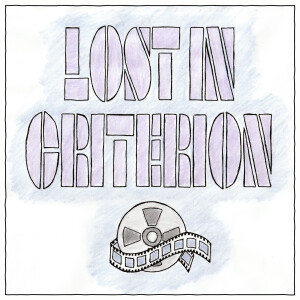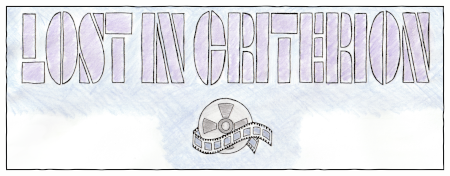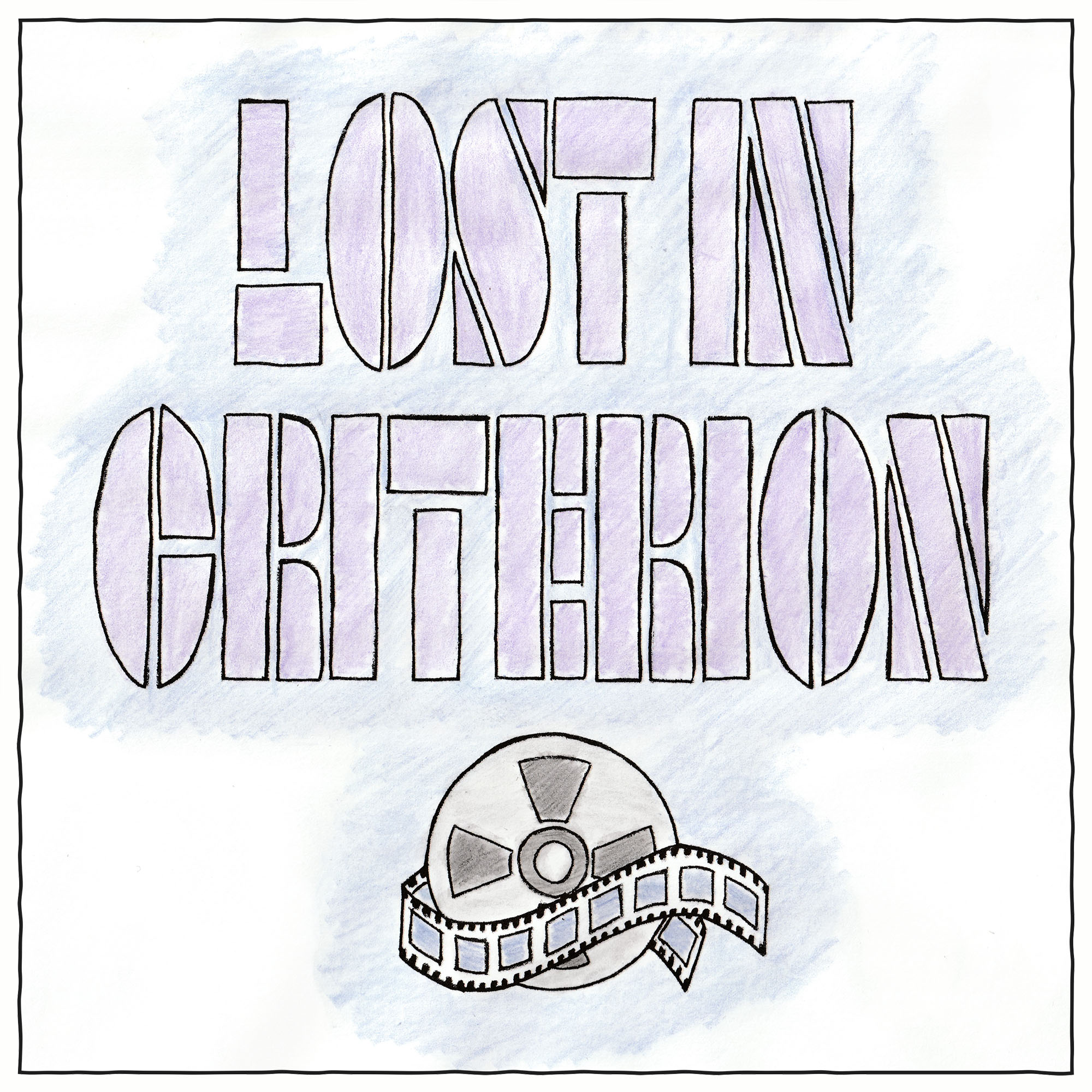Episodes

Saturday May 27, 2017
Spine 239: The Lower Depths
Saturday May 27, 2017
Saturday May 27, 2017
Two movies for the price of one with this week's outing. In 1902 Maxim Gorky debuted his play The Lower Depths about a group of people living in a flophouse in Russia. It was an international hit of a character study, leading to localizations around the world. In 1957 Akira Kurosawa made a version that was fairly faithful to the source material except transported to 19th century Japan. In 1936 Jean Renoir made it into a romantic comedy.
Reportedly, Gorky actually liked Renoir's version, but even Renoir recognized that Kurosawa made the better adaptation. They're both wonderful movies and are both included in the Criterion Collection's The Lower Depths double disc.

Friday May 19, 2017
Spine 238: A Woman is a Woman
Friday May 19, 2017
Friday May 19, 2017
Godard's ode to Lubitsch isn'y quite as eye-rolly as the title suggests.

Friday May 12, 2017
Spine 237: Smiles of a Summer Night
Friday May 12, 2017
Friday May 12, 2017
Many of Ingmar Bergman's films could be called comedies in the existential cosmic absurdism sense, but Smiles of a Summer Night (1955) is a romantic comedy sex romp with shades of Oscar Wilde. It was Bergman's big break. He'd been making films for over a decade with nothing landing with an audience. He was at his wits end, even thought he was dying, and desperately needed a win. Which he definitely got here.

Friday May 05, 2017
Spine 236: Mamma Roma
Friday May 05, 2017
Friday May 05, 2017
It was only a matter of time before we had to watch another Pier Paolo Pasolini film. And after that first one, so many years ago, we were not looking forward to it. But no movie could be another Salo, though I'm sure some have tried.
Mamma Roma is, in a way, a proto-Salo, though. It is a critique of Italian identity and power structures that while comparatively mild I can imagine that between its release in 1962 and Salo's in 1975 Pasolini boiled over from wanting to be heard properly. "We are bad people. We do bad things to ourselves." is the refrain (echoed by Visconti in last week's The Leopard as well), the message here is a slow simmer compared to what it would become, but no less unsubtle.

Friday Apr 28, 2017
Spine 235: The Leopard
Friday Apr 28, 2017
Friday Apr 28, 2017
"We were the leopards, the lions, those who take our place will be jackals, hyenas and the whole lot of us - leopards, lions, jackals and sheep - will continue to think ourselves the salt of the earth."

Friday Apr 21, 2017
Spine 234: The Tin Drum
Friday Apr 21, 2017
Friday Apr 21, 2017
Yesterday was Hitler's birthday, so here's a film with a complicated relationship to Nazis?
On the one hand Volker Schlondorff's The Tin Drum (1979) does show some of the horrors of living under Nazi occupation in Gdańsk-- I've just now learned that Danzig is the German name for the city, and it seems inappropriate to use it here, Gdansk is the Polish name -- and it briefly embodies the aftermath of the Holocaust in one scarred character (who was only recently re-added to the film for this Criterion release). On the other it is based on a book by a man that hid that he was a Nazi soldier for decades and is about someone who uses Nazism when its useful to him and abandons it when its not.
Of course it's also about a little boy who quite literally refuses to grow up.
As I said, it's complicated.

Friday Apr 14, 2017
Spine 233: Stray Dog
Friday Apr 14, 2017
Friday Apr 14, 2017
Toshiro Mifune and Takashi Shimura are two of the greatest actors of the 20th century. It happens that they also frequently collaborated with one another and with some of the greatest film directors to come out of mid-century Japan. As such, it seems they may be the actors who most often appear in the Criterion Collection as well, though it's hard to track that information without it becoming a whole new obsession.
They costar in Stray Dog under the helm of Criterion standard Akira Kurosawa from 1949 and it would be a feat of pure disaster if all that talent didn't make for an amazing film. Plus it's a police procedural! Who doesn't love a good police procedural?

Friday Apr 07, 2017
Friday Apr 07, 2017
We return to the Yasujiro Ozu well with a double feature, or as Pat corrects me, a one and a half feature. Ozu made the silent black-and-white A Story of Floating Leaves in 1934 then during a break in his production schedule after finishing Good Morning early in 1959 he remade it as Floating Leaves in color and with sound. Fascinating to see a great artist approach the same basic material a quarter-century apart.

Friday Mar 31, 2017
Spine 231: The Testament of Dr. Mabuse
Friday Mar 31, 2017
Friday Mar 31, 2017
There are only three Fritz Lang films in the Collection -- discounting his delightful appearance as himself in Godard's Contempt -- and these appearances are fairly spread out. We last saw from him with Spine 30 and will next see him at Spine 649. But for now we have Spine 231, his 1933 follow up and sort of sequel to M (as Otto Wernicke plays the same detective in both): The Testament of Dr. Mabuse.
M had an interesting background in that Nazis tried to shut it down during pre-production despite their not having come to full political power and Lang's insistence that the film was not meant to be anti-Nazi. The Testament of Dr. Mabuse, however, was dedicatedly anti-Nazi and, well, the Nazis were many things, but they weren't really dense. The film was banned in Germany, not shown publicly in the country until 1961. It was the last film he made in Germany until 1959.

Friday Mar 24, 2017
Spine 230: 3 Women
Friday Mar 24, 2017
Friday Mar 24, 2017
Robert Altman has had a long and varied career and Pat and I have only been familiar with his commercial highlights: M.A.S.H., Popeye -- plus for some reason I've seen Gosford Park and A Prairie Home Companion. None of them in the Collection though Altman does make quite a showing.
His first film that Criterion presents to us is 3 Women from 1977, a surreal and dreamlike drama of identity theft, which is appropriate since apparently Altman was inspired to make the film from a dream that he was making a film in the desert with Shelly Duvall and Sissy Spacek and decided that, hey, he should do that.

Friday Mar 17, 2017
Spine 229: Scenes from a Marriage
Friday Mar 17, 2017
Friday Mar 17, 2017
Scenes from a Marriage started life as a 6-part miniseries on Swedish television one episode per week from April 11 to May 16, 1973, and it is best experienced in that pacing: watch an episode then let each scene sink in before you move on. Six weeks may be too much time, but six nights may be just as good. Plumbing the depths of a relationship so perfectly its no surprise that an international release was sought, but director Ingmar Bergman found trouble convincing foreign television broadcasters to carry a subtitled mini-series. So Bergman edited it all down into a single 167 minute film that is not nearly as impactful. Still great. But not as great.

Saturday Mar 11, 2017
Spine 228: Salvatore Giuliano
Saturday Mar 11, 2017
Saturday Mar 11, 2017
With Salvatore Giuliano (1962) Francesco Rosi strove not just to make a biopic of the famed Sicilian outlaw, but to make a neo-realist docu-drama. Pat calls it a proto-History Channel special, and there's strong comparisons, but Rosi's film goes beyond that low bar. One because the film is simply so expertly shot, but also because unlike, say, Ancient Aliens, Rosi sought to only include the facts as he could verify them, ultimately, then, interrogating the official story and making a highly politically-charged thriller.

Saturday Mar 04, 2017
Spine 227: Le Corbeau
Saturday Mar 04, 2017
Saturday Mar 04, 2017
It takes a special talent to piss off the liberals, the conservatives, the church, the Nazis, and the Resistance, but Henri-Georges Clouzot is a special talent. Of course, holding a mirror up to German-occupied France during the war is a pretty easy way to garner that reaction. Clouzot did just that in Le Corbeau, his 1943 proto-noir. And aside from getting everyone mad at him, he also made it with Continental Films, the sole authorized movie production house in Nazi-occupied France, which give the post-war government the ammunition needed to bar the film's release forever as well as ban Clouzot from ever making a movie again. Both bans lasted just a few years.

Saturday Feb 25, 2017
Spine 226: Onibaba
Saturday Feb 25, 2017
Saturday Feb 25, 2017
Ok, so Pat doesn't like scary movies, but the Japanese horror films we've seen so far have been something else entirely. Kwaidan, for instance, was a more a collection of folk tales that happened to have ghosts involved.
Similarly, Kaneto Shindo's 1964 film Onibaba isn't much of a horror film, though it's not exactly a folk tale, either. More of the story of the "true" inspiration that became the folk tale of the "Demon hag", though Pat takes some umbrage with translating "baba" as "hag" because, really, who uses the word hag anymore?

Friday Feb 17, 2017
Spine 225: Tunes of Glory
Friday Feb 17, 2017
Friday Feb 17, 2017
I knew nothing about Tunes of Glory before watching it except that Ronald Neame directed it and Alec Guinness stars as a Scotsman. Since all the Neame films we've seen so far have been delightfully fun and Guiness heavily made up is good for a laugh or a cringe, I'll be honest I was expecting this 1960 film to be a bit of a lark. It is not. It is so not. And it is wonderful.

Friday Feb 10, 2017
Spice 224: Pickup on South Street
Friday Feb 10, 2017
Friday Feb 10, 2017
Sam Fuller is a pulpy director, but that's not a problem when it's fun. The issue with Pickup on South Street isn't even necessarily that it isn't fun, I suppose. The problem is that his 1953 "spy" film is just poorly written with character motivation poorly defined and the characters themselves not defined much better. Fuller wrote it himself, so I can't let him off the hook here, but it's still a beautifully shot film and he's responsible for that aspect as well.

Friday Feb 03, 2017
Spice 223: Maitresse
Friday Feb 03, 2017
Friday Feb 03, 2017
The last time we heard from Barbet Schroeder was in his documentary General Idi Amin Dada about a clearly insane man which allowed us to talk about exploitation in documentaries which gets even more interesting when you can't be sure if it's the director or the subject exploiting the other more.
The very next film he worked on may lead to similar concerns of exploitation if it weren't for the concept of informed consent and the fairly clear facts that everything is above board and everyone is on board and a certain board gets used for a purpose I will not quickly forget, but I digress.
Maîtresse (1975) is a traditional boy-meets-girl love story where one part of the couple has to come to terms with something the other does that threatens to undermine their relationship. It's a common enough storyline, though the "something" in this particular instance is that Gerard Depardieu's new girlfriend is a BDSM mistress. Originally Rated X in the US and flat out banned in Britain despite the act that the Brits recognized it as a worthwhile film with some rather graphic content that they just weren't comfortable with.

Friday Jan 27, 2017
Spine 222: Diary of a Country Priest
Friday Jan 27, 2017
Friday Jan 27, 2017
Going through the Criterion Collection by Spine number often leaves us with some interesting thematic pairs that are just disconnected enough to seem accidental: the earliest that comes to mind is the racist undertones of #32 Oliver Twist and #33 Nanook of the North.
Likewise last week's Ikiru and this week's film both deal with men dying of stomach cancer. They take vastly different paths. Robert Bresson writes and directs Diary of a Country Priest (1951), a fairly heavy film, that may have been better if it were heavier.

Friday Jan 20, 2017
Spine 221: Ikiru
Friday Jan 20, 2017
Friday Jan 20, 2017
When confronted with mortality, a man decides to change his life. In the West these stories (A Christmas Carol, It's a Wonderful Life) are usually framed around Christmas for the inherent symbolism of the holiday in particular and winter in general.
With Ikiru (1952) Akira Kurosawa makes the best version of this type of story without any over religion, just humanity. It's quite probably his best film, though we've probably said that before.

Friday Jan 13, 2017
Spine 220: Naked Lunch
Friday Jan 13, 2017
Friday Jan 13, 2017
We start this week's episode with 15 minutes about linguistics, so have fun with that.
Naked Lunch is a "transgressive" and "unfilmable" novel written by William S. Burroughs in 1959. So unfilmable, in fact, that when David Cronenberg decided to make a movie in 1991 it became less of an adaptation of the specific book and more of a meta-adaptation (or, as Pat argues when we finally start talking about the movie, an uber-meta-adaptation) of Burroughs life and creative process. It's messy and uneven.

Friday Jan 06, 2017
Spine 219: La Strada
Friday Jan 06, 2017
Friday Jan 06, 2017
When you start to believe that Fellini is honest when he says that all his films are autobiographical you understand that this is an admission of guilt.

Friday Dec 30, 2016
Spine 218: Le Cercle Rouge
Friday Dec 30, 2016
Friday Dec 30, 2016
Jean-Pierre Melville's Le Cercle Rouge (1970) opens with a nonsensical and overwrought (and fabricated) quote from the Buddha. It sets a tone for the entire film. Nothing really makes sense, everyone makes decisions against their barely established character and motivations are at best unclear.
But it does let us reflect on all the other gangster films we've watched that we loved or hated! Good times!

Friday Dec 23, 2016
Holiday Special 5: Cobra
Friday Dec 23, 2016
Friday Dec 23, 2016
It's that time of year again! The time where we gather close to loved ones and, at least in the northern hemisphere, try to stay warm through the darkness. Whatever your position on this planet, though, assuming you count time by the Gregorian calendar it's also the time of looking back at what has passed and hoping in what may come.
Or hoping against what you fear may come.
2016 has been...complicated. 2017 isn't going to be much easier. But we can strive to make it better.
We finish things off, as we always do, with a seasonally appropriate non-Criterion Collection movie. This year it's Sylvester Stallone's 1986 film Cobra. George P. Cosmatos directs this just awful film -- awful both in product and moral. Donovan Hill and Stephen Goldmeier, two long time guests and practicing defense attorneys, join us for a film that is like Dirty Harry on speed, the story of a cop who is do dedicated to "justice" that he's willing to punch out a reporter who suggests that criminals may have civil rights. Oh and that cop murders a lot of people. Ostensibly he is the good guy here. There are no good guys here.

Friday Dec 16, 2016
Spine 217: Tokyo Story
Friday Dec 16, 2016
Friday Dec 16, 2016
Yasujiro Ozu's 1953 drama Tokyo Story is principally about the slow march toward the future. Things change, and the sooner you accept that, the better. That's not to say that Ozu doesn't think one should hold on to the past, but just don't be controlled by it.

Friday Dec 09, 2016
Spine 216: The Rules of the Game
Friday Dec 09, 2016
Friday Dec 09, 2016
Jean Renoir made one of the greatest anti-war movies ever with 1937's The Grand Illusion, a war film that is actually an anti-war film designed to showcase that all men are truly brothers, that everyone's essentially the same no matter that country they may hail from. Renoir had seen the writing on the wall and new that war was coming. Having lived through World War I, Renoir was desperate to avoid another one.
War came.
The Rules of the Game (1939) is a second, and much more subtle attempt. After the Munich Agreement found the European powers opting for "peace for our time" and a normalization and appeasement of Hitler's power and land grabs, Renoir knew he had to do more, so he made the greatest anti-war movie of all time and disguised it as a bedroom/upper class farce.
It still didn't work, but goodness is it a valiant attempt.
We recorded this episode November 12, 2016, less than a week after the US election.
We welcome any pushes against normalization and appeasement.

